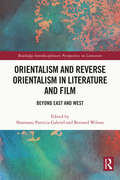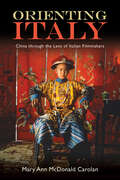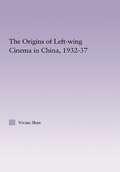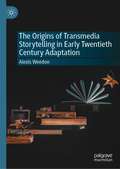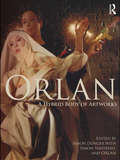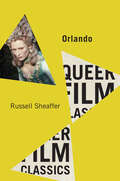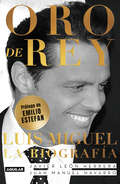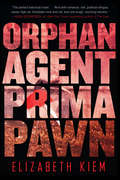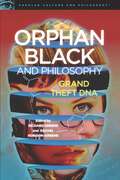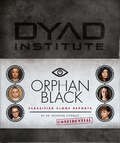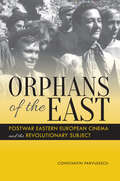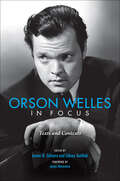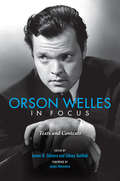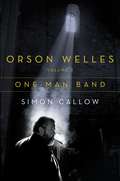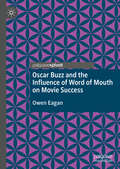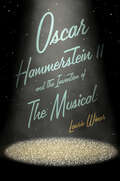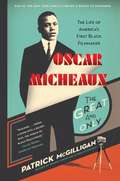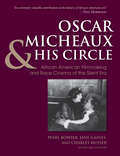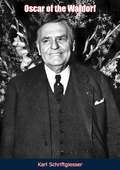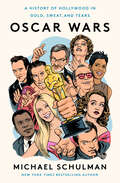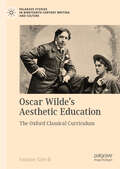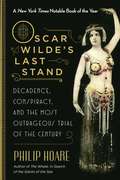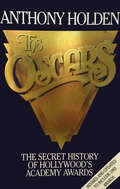- Table View
- List View
Orientalism and Musical Mission: Palestine and the West
by Rachel Beckles WillsonOrientalism and Musical Mission presents a new way of understanding music's connections with imperialism, drawing on new archive sources and interviews and using the lens of 'mission'. Rachel Beckles Willson demonstrates how institutions such as churches, schools, radio stations and governments, influenced by missions from Europe and North America since the mid-nineteenth century, have consistently claimed that music provides a way of understanding and reforming Arab civilians in Palestine. Beckles Willson discusses the phenomenon not only in religious and developmental aid circles where it has had strong currency, but also in broader political contexts. Plotting a historical trajectory from the late Ottoman and British Mandate eras to the present time, the book sheds new light on relations between Europe, the USA and the Palestinians, and creates space for a neglected Palestinian music history.
Orientalism and Reverse Orientalism in Literature and Film: Beyond East and West (Routledge Interdisciplinary Perspectives on Literature)
by Sharmani Patricia Gabriel Bernard WilsonAcknowledging the significance of Edward Said’s Orientalism for contemporary discourse, the contributors to this volume deconstruct, rearrange, and challenge elements of his thesis, looking at the new conditions and opportunities offered by globalization. What can a renewed or reconceptualized Orientalism teach us about the force and limits of our racial imaginary, specifically in relation to various national contexts? In what ways, for example, considering our greater cross-cultural interaction, have clichés and stereotypes undergone a metamorphosis in contemporary societies and cultures? Theoretically, and empirically, this book offers an expansive range of contexts, comprising the insights, analytical positions, and perspectives of a transnational team of scholars of comparative literature and literary and cultural studies based in Australia, Hong Kong, Japan, Malaysia, USA, Singapore, Taiwan, and Turkey. Working with, through and beyond Orientalism, they examine a variety of cultural texts, including the novel, short story, poetry, film, graphic memoir, social thought, and life writing. Making connections across centuries and continents, they articulate cultural representation and discourse through multiple approaches including critical content analysis, historical contextualization, postcolonial theory, gender theory, performativity, intertextuality, and intersectionality. Given its unique approach, this book will be essential reading for scholars of literary theory, film studies and Asian studies, as well as for those with a general interest in postcolonial literature and film.
Orienting Italy: China through the Lens of Italian Filmmakers (SUNY series, Horizons of Cinema)
by Mary Ann McDonald CarolanWinner of the 2022 Book Award for Performance and Visual Culture presented by the American Association of Teachers of ItalianOrienting Italy explores contemporary Italian filmmakers' fascination with China and the Chinese in both documentary and fictional films. Delineating the contours of this fascination, the book begins with the works of Carlo Lizzani (Behind the Great Wall, 1958) and Michelangelo Antonioni (Chung Kuo—China, 1972), both of whom ventured to China with the aim of documenting new, yet physically and culturally distant, realities. Their documentary investigations yielded to fictional portrayals, from the lavish view of a historical Middle Kingdom by director Bernardo Bertolucci (The Last Emperor, 1987) to the stark consideration of Italian economic exchange with contemporary China by Gianni Amelio (The Missing Star, 2006). The wave of Chinese migration to Italy in the late twentieth century created a new sense of otherness within Italy as Chinese migrants became the subjects of fictional narratives and documentaries in the works of Stefano Incerti (Gorbaciof, 2010) and Andrea Segre (Shun Li and the Poet, 2011) and Riccardo Cremona and Vincenzo De Cecco (Miss Little China, 2009). In the twenty-first century, a new chapter in the relationship between Italy and China has emerged in the form of transnational collaborations in the art and business of filmmaking.
The Origins of Leftwing Cinema in China, 1932-37 (East Asia: History, Politics, Sociology and Culture)
by Vivian ShenThis book takes a cultural studies approach to analyze and account for the ways in which related to film, literature, cultural production, ideology, social change and modernity were in raised in the leftwing film movement of the 1930s.
The Origins of Transmedia Storytelling in Early Twentieth Century Adaptation
by Alexis WeedonThis book explores the significance of professional writers and their role in developing British storytelling in the 1920s and 1930s, and their influence on the poetics of today’s transmedia storytelling. Modern techniques can be traced back to the early twentieth century when film, radio and television provided professional writers with new formats and revenue streams for their fiction. The book explores the contribution of four British authors, household names in their day, who adapted work for film, television and radio. Although celebrities between the wars, Clemence Dane, G.B. Stern, Hugh Walpole and A.E.W Mason have fallen from view. The popular playwright Dane, witty novelist Stern and raconteur Walpole have been marginalised for being German, Jewish, female or gay and Mason’s contribution to film has been overlooked also. It argues that these and other vocational authors should be reassessed for their contribution to new media forms of storytelling. The book makes a significant contribution in the fields of media studies, adaptation studies, and the literary middlebrow.
ORLAN: A Hybrid Body of Artworks
by Simon DongerORLAN: A Hybrid Body of Artworks is an in-depth academic account of ORLAN's pioneering art in its entirety. The book covers her career in performance and a range of other art forms. This single accessible overview of ORLAN's practices describes and analyses her various innovative uses of the body as artistic material. Edited by Simon Donger with Simon Shepherd and ORLAN herself, the collection highlights her artistic impact from the perspectives of both performance and visual cultures. The book features: vintage texts by ORLAN and on ORLAN's work, including manifestos, key writings and critical studies ten new contributions, responses and interviews by leading international specialists on performance and visual arts over fifty images demonstrating ORLAN's art, with thirty full colour pictures a new essay by ORLAN, written specially for this volume a new bibliography of writing on ORLAN an indexed listing of ORLAN’s artworks and key themes.
Orlando (Queer Film Classics)
by Russell SheafferA film that transcends time, Sally Potter’s Orlando follows its titular character through nearly four hundred years of British history. Orlando starts life as a young man in the 1600s and then, mid-film, becomes a woman in the 1800s. Plot, production, and performance have all contributed to the film becoming a touchstone for Tilda Swinton’s ethereal and gender-bending mode.A Russian-French-Dutch-American-Italian-British co-production, Orlando was hailed as a monumental work of international art house cinema upon its release in 1992. Some understood Potter’s film, a work of ruthless and ingenious adaptation, as moving away from the lesbian content of Virginia Woolf’s novel. Russell Sheaffer uses a detailed analysis of screenplay drafts and more than three decades of reception to argue that while the film moves away from a direct investment in same-sex relationships, Orlando’s articulations of embodiment, desire, and time have made the film continually more queer in the years since its release.Taking cues from adaptation theory and gender studies, this book meticulously charts the distinct shift from lesbian feminist text to queer film classic, arguing that the film is as much an adaptation of Woolf’s A Room of One’s Own as it is of its eponymous novel.
Oro de rey: Luis Miguel. La biografía
by Francisco Javier León HerreraEsta nueva biografía, impactante y reveladora como las anteriores, profundiza en los aspectos más importantes de su vida. Desnuda al ser humano que hay detrás de la leyenda, comparte las claves de su extenso legado musical lleno de anécdotas y complicadas decisiones, así como el bagaje existencial de amor, dolor, amistades, traiciones, heridas familiares, sueños rotos, amargura y esperanza. Tras sus dos bestsellers sobre el Sol: Luis Mi Rey, biografía autorizada por el artista que sirvió de base para la serie televisiva sobre su vida, y el más reciente, Luis Miguel: la historia, Javier León Herrera y Juan Manuel Navarro completan la trilogía sobre la existencia del cantante más amado en México, Argentina, Colombia, Estados Unidos, Chile, Puerto Rico, Perú, Bolivia, Brasil, España, Italia y Centroamérica. Oro de Rey ayuda a comprender más al artista adentrándose en el adulto lejos de la sombra -no del fantasma- de Luisito Rey. Gracias a sus confesiones y al testimonio de las personas que más lo conocen, los autores desvelan, con rigor y respeto, a un Luis Miguel más íntimo. En estas páginas se descubrirán los miedos, las luces y las sombras de un luchador que no deja de preguntarse por qué ha tenido que nadar tanto tiempo refugiado en un caparazón, a contracorriente de su propio espíritu y deseo, urgido de una catarsis definitiva que cierre círculos y sane su alma de tantas heridas. Los autores se adentran en aspectos determinantes de su vida: sus huellas de abandono, la ausencia materna, su hogar roto, los hermanos separados, sus éxitos y su estancamiento en la más reciente y profunda crisis en la que tocó fondo: el "Trienio Horribilis" de 2015 a 2017, y su resurgir en 2018, con los detalles de su renacer con el que celebró 50 años: sus bodas de oro con la vida. ¡Larga vida al Rey!
Orphan, Agent, Prima, Pawn
by Elizabeth KiemThe Bolshoi Saga: SvetlanaThe year is 1958, and sixteen-year-old Svetlana is stuck in a Moscow orphanage designated for the unwanted children of Stalin’s enemies. Ballet is her obsession and salvation, her only hope at shedding a tainted family past. When she is invited to join the Bolshoi Ballet—the crown jewel of Russian culture and the pride of the Soviet Union—her dreams appear to have been realized. But she quickly learns that nobody’s past or secrets are safe.The dreaded KGB knows about the mysterious trances Sveta has suffered, inexplicable episodes that seem to offer glimpses of the past. Some very powerful people believe Sveta is capable of serving the regime as more than a ballerina, and they wish to recruit her to spy on the West as part of the nascent Soviet psychic warfare program. If she is to erase the sins of her family, if she is to dance on the world stage for the Motherland—if she is to survive—she has no choice but to explore her other gift.
Orphan Black and Philosophy
by Richard Greene Rachel Robison-GreeneIn Orphan Black, several apparently unconnected women discover that they are exact physical doubles, that there are more of them out there, that they are all illegally produced clones, and that someone is having them killed. They find themselves in the midst of a secret and violent struggle between a fundamentalist religious group, a fanatical cult of superhuman biological enhancement, a clandestine department of the military, and a giant biotech corporation. Law enforcement is powerless and easily manipulated by these sinister forces. The clones are forced to form their own Clone Club, led by the resourceful Sarah Manning, to defend themselves against their numerous enemies and to find out exactly where they came from and why. <p><p> Orphan Black continually raises philosophical issues, as well as ethical and policy questions deserving philosophical analysis. What makes a person a unique individual? Why is it so important for us to know where we came from? Should we have a say in whether a clone is made of us? Is it immoral to generate clones with built-in health problems or personality defects - and if so, does that mean that producers of clones must practice eugenic selection? What light does the behavior of members of the Clone Club shed on the nature-nurture debate? Is it relevant that most are heterosexual, one is a lesbian, and one is a transgender male? <p> This TV show shows us problems of biotechnology which will soon be vital everyday issues. But what kind of a future faces us when human clones are commonplace? Will groups of human clones have a tight bond of solidarity making them a threat to democracy? If the world is going to be taken over by an evil conspiracy, would it better be a scientific cult like Neolution or a religious cult like the Prolethians? Should biotech corporations be able to own the copyright on human DNA sequences? What rules of morality apply when you can't trust the police and powerful groups are ready to murder you?
Orphan Black Classified Clone Reports: The Secret Files of Dr. Delphine Cormier
by Delphine CormierFrom the secret files of Dr. Delphine Cormier, comes this ultimate guide to all of the characters, conspiracies, and shadowy organizations in the smart, innovative BBC America television thriller Orphan Black.Designed to resemble the classified files and notes of Dr. Delphine Cormier, this in-world compendium chronicles the inner workings of the mysterious people and organizations at the heart of the acclaimed hit television series Orphan Black. A detailed and creative look at the thrilling international hit series, Orphan Black Classified Clone Report includes detailed dossiers of Sarah Manning, Felix Dawkins, and all of the show’s beloved characters; examines every twist and turn from season one to the present; provides exclusive information on the Dyad Institute, the Neolution clone program, and the notorious Proletheans; and features observations of the different clones from their monitors, classified intelligence, breakthroughs in Cosima’s research, and private journal entries chronicling Delphine’s experience with the clone club and her own complicated love for Cosima. Packed with exclusive concept art, photos, and intriguing removable inserts and ephemera, Orphan Black Classified Clone Report is an immersive reading experience and essential companion for fans of Orphan Black.
Orphans of the East: Postwar Eastern European Cinema And The Revolutionary Subject
by Constantin ParvulescuUnlike the benevolent orphan found in Charlie Chaplin's The Kid or the sentimentalized figure of Little Orphan Annie, the orphan in postwar Eastern European cinema takes on a more politically fraught role, embodying the tensions of individuals struggling to recover from war and grappling with an unknown future under Soviet rule. By exploring films produced in postwar Hungary, the German Democratic Republic, Czechoslovakia, Romania, and Poland, Parvulescu traces the way in which cinema envisioned and debated the condition of the post-World War II subject and the "new man" of Soviet-style communism. In these films, the orphan becomes a cinematic trope that interrogates socialist visions of ideological institutionalization and re-education and stands as a silent critic of the system's shortcomings or as a resilient spirit who has resisted capture by the political apparatus of the new state.
Orson Welles in Focus: Texts and Contexts
by James N. Gilmore and Sidney Gottlieb“A wonderful and distinct addition to the Welles canon . . . these pieces explore key elements of Welles’s career, personality, and political beliefs.” —Library JournalThrough his radio and film works, such as The War of the Worlds and Citizen Kane, Orson Welles became a household name in the United States. Yet Welles’s multifaceted career went beyond these classic titles and included lesser-known but nonetheless important contributions to television, theater, newspaper columns, and political activism. Orson Welles in Focus: Texts and Contexts examines neglected areas of Welles’s work, shedding light on aspects of his art that have been eclipsed by a narrow focus on his films. By positioning Welles’s work during a critical period of his activity (the mid-1930s through the 1950s) in its larger cultural, political, aesthetic, and industrial contexts, the contributors to this volume examine how he participated in and helped to shape modern media. This exploration of Welles in his totalityilluminates and expands our perception of his contributions that continue to resonate today.“Anyone who thinks they know Welles will have their eyes opened [by this book].” —Paul Heyer, author of The Medium and the Magician“This is a fascinating collection, several of the contributions making the reader wish for more.” —Film International“A team of scholars has examined the many facets of Orson Welles’ amazing life—theatrical innovator, radio star, celebrated filmmaker, newspaper columnist and progressive activist.” —Wellesnet
Orson Welles in Focus: Texts and Contexts
by James Naremore James N. Gilmore Sidney GottliebThrough his radio and film works, such as The War of the Worlds and Citizen Kane, Orson Welles became a household name in the United States. Yet Welles’s multifaceted career went beyond these classic titles and included lesser-known but nonetheless important contributions to television, theater, newspaper columns, and political activism. Orson Welles in Focus: Texts and Contexts examines neglected areas of Welles’s work, shedding light on aspects of his art that have been eclipsed by a narrow focus on his films. By positioning Welles’s work during a critical period of his activity (the mid-1930s through the 1950s) in its larger cultural, political, aesthetic, and industrial contexts, the contributors to this volume examine how he participated in and helped to shape modern media. This exploration of Welles in his totality illuminates and expands our perception of his contributions that continue to resonate today.
Orson Welles, Volume 3: One-Man Band
by Simon CallowThe third volume of Simon Callow's acclaimed Orson Welles biography, covering the period of his exile from America (1947-1964), when he produced some of his greatest works, including Touch of EvilIn One-Man Band, the third volume in his epic and all-inclusive four-volume survey of Orson Welles's life and work, the celebrated British actor Simon Callow again probes in comprehensive and penetrating detail into one of the most complex, contradictory artists of the twentieth century, whose glorious triumphs (and occasional spectacular failures) in film, radio, theater, and television introduced a radical and original approach that opened up new directions in the arts. This volume begins with Welles's self-exile from America, and his realization that he could function only to his own satisfaction as an independent film maker, a one-man band, in fact, which committed him to a perpetual cycle of money raising. By 1964, he had filmed Othello, which took three years to complete; Mr. Arkadin, the most puzzling film in his output; and a masterpiece in another genre, Touch of Evil, which marked his one return to Hollywood, and like all too many of his films was wrested from his grasp and reedited. Along the way he made inroads into the fledgling medium of television and a number of stage plays, of which his 1955 London Moby-Dick is considered by theater historians to be one of the seminal productions of the century. His private life was as spectacularly complex and dramatic as his professional life. The book reveals what it was like to be around Welles, and, with an intricacy and precision rarely attempted before, what it was like to be him, answering the riddle that has long fascinated film scholars and lovers alike: Whatever happened to Orson Welles?
Oscar Buzz and the Influence of Word of Mouth on Movie Success
by Owen EaganThis book explores why word of mouth is the most important determinant of a movie’s success. Beginning with a discussion of the enduring appeal of movies, and why the box office has survived the disruption of television and will likely survive the disruption of streaming services, Owen Eagan goes on to discuss the unpredictable nature of movies and ways to mitigate their risk. His astute analysis sheds light on the role of film festivals, film critics, Oscar campaigns, and word of mouth in influencing a film's success. Eagan concludes with a summary of why word of mouth is the most influential among all the variables that affect a film’s outcome. Expertly synthesizing quantitative analyses of box office data with illuminating insights from industry experts, this concise and engaging book presents findings with important implications for scholars, industry insiders and marketing professionals alike.
Oscar Hammerstein II and the Invention of the Musical
by Laurie WinerA new look at artist Oscar Hammerstein II as a pivotal and underestimated force in the creation of modern American culture You know his work—Show Boat, Oklahoma!, Carousel, The King and I. But you don’t really know Oscar Hammerstein II, the man who, more than anyone else, invented the American musical. Among the most commercially successful artists of his time, he was a fighter for social justice who constantly prodded his audiences to be better than they were. Diving deep into Hammerstein’s life, examining his papers and his lyrics, critic Laurie Winer shows how he orchestrated a collective reimagining of America, urging it forward with a subtly progressive vision of the relationship between country and city, rich and poor, America and the rest of the world. His rejection of bitterness, his openness to strangers, and his optimistic humor shaped not only the musical but the American dream itself. His vision can continue to be a touchstone to this day.
Oscar Micheaux: The Great and Only
by Patrick McgilliganOscar Micheaux was the Jackie Robinson of film, the black D. W. Griffith: a bigger-than-life American folk hero whose important life story is nearly forgotten today. Now, in a feat of historical investigation and vivid storytelling, one of our greatest film biographers takes on one of the most talented and complex figures in the history of American entertainment. The son of freed slaves, Micheaux grew up in Metropolis, Illinois, then roamed America as a Pullman porter before making his first mark as a homesteader in South Dakota. Disaster and defeat there led him to forge a career publishing a successful series of autobiographical novels. Ever the entrepreneur, when Hollywood failed to bid high enough for film rights to his stories, he answered by forming his own film production company. Going on to produce or direct twenty-two silent and fifteen sound films in his lifetime, Micheaux became the king of the "race cinema" industry at a time when black-produced films had to scrounge for venues in a segregated society. In this groundbreaking new biography, award-winning film historian Patrick McGilligan offers a vivid and fascinating portrait of this little-known pioneer. Part visionary, part raffish Barnum-like showman, Micheaux was both a maverick filmmaker and an inveterate hustler who used every weapon at his disposal to break the color barrier and thrive in a profession he helped to invent. He made a fortune and lost it again, and launched repeated con games that were followed by public arrests and bankruptcies. He eagerly took credit for the work of others-including his unsung-heroine wife. In his desperate later years, he even sunk to plagiarizing his final novel-a discovery McGilligan reveals here for the first time. In this searching exploration, McGilligan tracks down long-lost financial records, unpublished letters, and unmarked pauper's graves, pinpointing Micheaux's birthplace, his tangled personal life, and the circumstances of his tragic death. The result is an epic that bridges a fascinating period in American history, and offers lessons for anyone who would understand the role of black America in forming the culture of our time.
Oscar Micheaux and His Circle
by Charles Musser Jane Gaines Pearl BowserOscar Micheaux--the most prolific African American filmmaker to date and a filmmaking giant of the silent period--has finally found his rightful place in film history. Both artist and showman, Micheaux stirred controversy in his time as he confronted issues such as lynching, miscegenation, peonage and white supremacy, passing, and corruption among black clergymen. In this important collection, prominent scholars examine Micheaux's surviving silent films, his fellow producers of race films who alternately challenged or emulated his methods, and the cultural activities that surrounded and sustained these achievements. The relationship between black film and both the stage (particularly the Lafayette Players) and the black press, issues of underdevelopment, and a genealogy of Micheaux scholarship, as well as extensive and more accurate filmographies, give a richly textured portrait of this era. The essays will fascinate the general public as well as scholars in the fields of film studies, cultural studies, and African American history. This thoroughly readable collection is a superb reference work lavishly illustrated with rare photographs.
Oscar of the Waldorf
by Karl SchriftgiesserThe present volume is the biography of Oscar Tschirky (1866-1943), known throughout the world as Oscar of the Waldorf, who worked as maître d’hôtel of the Waldorf Astoria Hotel in New York City from 1893 to 1943. The book contains many recollections devoted to the Waldorf Astoria Hotel and its founder, George C. Boldt, and his wife, Louise Kehrer Boldt.Richly illustrated throughout with black and white photographs.
Oscar Wars: A History of Hollywood in Gold, Sweat, and Tears
by Michael SchulmanThe author of the New York Times bestseller Her Again: Becoming Meryl Streep returns with a lively history of the Academy Awards, focusing on the brutal battles, the starry rivalries, and the colorful behind-the-scenes drama.America does not have royalty. It has the Academy Awards. For nine decades, perfectly coiffed starlets, debonair leading men, and producers with gold in their eyes have chased the elusive Oscar. What began as an industry banquet in 1929 has now exploded into a hallowed ceremony, complete with red carpets, envelopes, and little gold men. But don’t be fooled by the pomp: the Oscars, more than anything, are a battlefield, where the history of Hollywood—and of America itself—unfolds in dramas large and small. The road to the Oscars may be golden, but it’s paved in blood, sweat, and broken hearts.In Oscar Wars, Michael Schulman chronicles the remarkable, sprawling history of the Academy Awards and the personal dramas—some iconic, others never-before-revealed—that have played out on the stage and off camera. Unlike other books on the subject, each chapter takes a deep dive into a particular year, conflict, or even category that tells a larger story of cultural change, from Louis B. Mayer to Moonlight. Schulman examines how the red carpet runs through contested turf, and the victors aren't always as clear as the names drawn from envelopes. Caught in the crossfire are people: their thwarted ambitions, their artistic epiphanies, their messy collaborations, their dreams fulfilled or dashed.Featuring a star-studded cast of some of the most powerful Hollywood players of today and yesterday, as well as outsiders who stormed the palace gates, this captivating history is a collection of revelatory tales, each representing a turning point for the Academy, for the movies, or for the culture at large.
Oscar Wilde's Aesthetic Education: The Oxford Classical Curriculum (Palgrave Studies in Nineteenth-Century Writing and Culture)
by Leanne GrechThis book focuses on the role that the Oxford classical curriculum has had in shaping Oscar Wilde’s aestheticism. It positions Wilde as a classically trained intellectual and outlines the path he took to gain recognition as a writer and promoter of the aesthetic movement. This narrative is conveyed through a broad range of literary sources, including Wilde’s travel poetry, American lectures, and canonical works like ‘The Critic as Artist’, The Soul of Man, The Picture of Dorian Gray and De Profundis. This study proposes that Wilde approached aestheticism as a personalised, self-directed learning experience – a mode of self-culture – which could be used to maintain an intellectual life outside of the university. It also explores Wilde’s thoughts on education and considers the significance of male friendship at Oxford, and in Wilde’s life and literature.
Oscar Wilde's Last Stand: Decadence, Conspiracy, and the Most Outrageous Trial of the Century
by Philip HoareA New York Times Notable Book of the Year that Sir Ian McKellen called "a shocking tale of heroes and villains-illuminating and upsetting in equal measure.”The first production of Oscar Wilde’s Salomé in 1918, with American exotic dancer Maud Allan dancing lead, ignited a firestorm in London spearheaded by Noel Pemberton Billing, a member of Parliament and self-appointed guardian of family values. Billing attacked Allan in the right-wing newspaper Vigilante as a member of the "Cult of the Clitoris,” a feminine version of the "Cult of the Wilde,” a catchall for the degeneracy and perversion he was convinced had infected the land. He claimed that a black book was in the hands of their enemies the Germans, a book that contained the names of thousands of the British establishment who without doubt were members of the cult. Threat of exposure was costing England the war.Allan sued Billing for libel, and the ensuing trial, brought to life in this authoritative, spellbinding book, held the world in thrall. Was there or was there not a black book? What names did it contain? The trial was both hugely entertaining and deadly serious and raised specters of hysteria, homophobia, and paranoia that, like Oscar Wilde himself, continue to haunt us. As in Wilde’s own trial in 1895, libel was hardly the issue; the fight was for control over the country’s moral compass. In Oscar Wilde’s Last Stand, biographer and historian Philip Hoare gives us the full drama of the Billing trial, gavel to gavel, and brings to life this unique, bizarre, and fascinating event.Skyhorse Publishing, as well as our Arcade imprint, are proud to publish a broad range of books for readers interested in history--books about World War II, the Third Reich, Hitler and his henchmen, the JFK assassination, conspiracies, the American Civil War, the American Revolution, gladiators, Vikings, ancient Rome, medieval times, the old West, and much more. While not every title we publish becomes a New York Times bestseller or a national bestseller, we are committed to books on subjects that are sometimes overlooked and to authors whose work might not otherwise find a home.
The Oscars
by Anthony HoldenIt is just thirteen inches tall and weighs eight pounds, yet the Oscar has come to exert an hypnotic hold over film performers and audiences alike. This book uses the narrative story of an individual year as the basis of a much broader and historical canvas, to present a portrait of the film world today, and its personalities, finances and power-struggles. It also includes detailed lists of Oscar facts and figures, winners and losers. The author's other books include best-selling biographies of Prince Charles and Laurence Olivier.
The Oscars
by Anthony HoldenIt is just thirteen inches tall and weighs eight pounds, yet the Oscar has come to exert an hypnotic hold over film performers and audiences alike. This book uses the narrative story of an individual year as the basis of a much broader and historical canvas, to present a portrait of the film world today, and its personalities, finances and power-struggles. It also includes detailed lists of Oscar facts and figures, winners and losers. The author's other books include best-selling biographies of Prince Charles and Laurence Olivier.

